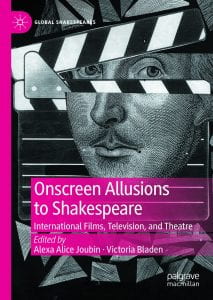 Shakespeare’s plays and motifs have been cited and appropriated on screen since motion pictures were invented in 1893. Allusions to Shakespeare haunt our contemporary culture in a myriad of ways, whether through brief references or sustained intertextual engagements. ...continue reading "When Films Allude to Shakespeare …"
Shakespeare’s plays and motifs have been cited and appropriated on screen since motion pictures were invented in 1893. Allusions to Shakespeare haunt our contemporary culture in a myriad of ways, whether through brief references or sustained intertextual engagements. ...continue reading "When Films Allude to Shakespeare …"
Tag: appropriation
How Shakespeare Cures a Stuttering King
 The King's Speech (dir. Tom Hooper, 2010) and The Theory of Everything (dir. James Marsh, 2015) deal with figures that suffer from speech impairment. Lines from Shakespeare play an important role in scenes about speech therapy in The King's Speech.
The King's Speech (dir. Tom Hooper, 2010) and The Theory of Everything (dir. James Marsh, 2015) deal with figures that suffer from speech impairment. Lines from Shakespeare play an important role in scenes about speech therapy in The King's Speech.
Having worked with multiple therapists without any result, Bertie (Prince Albert, Duke of York, later King George VI), a stutterer, is reluctant to receive treatment from Lionel Logue. In their first session, Logue bets Bertie a shilling that he can in fact read without stammer right away, and he would record his speech as evidence. Logue puts headphones on Bertie and asks him to read Hamlet’s “to be or not to be” speech into a Silvertone Home Voice Recorder. ...continue reading "How Shakespeare Cures a Stuttering King"
Ethics of Performative Citations of Shakespeare
 Global Shakespeare can be studied through two interrelated concepts: performance as an act of citation and the ethics of citation. Appropriating the classics carries strong ethical implications. A crucial, ethical component of appropriation is one’s willingness to listen to and be subjected to the demands of others. These metaphorical citations create moments of self and mutual recognition. Seeing the others within is the first step toward seeing oneself in others’ eyes. The act of citation is founded upon the premise of one’s subjectivity, the subject who speaks, and the other’s voice that one is channeling, misrepresenting, or appropriating. ...continue reading "Ethics of Performative Citations of Shakespeare"
Global Shakespeare can be studied through two interrelated concepts: performance as an act of citation and the ethics of citation. Appropriating the classics carries strong ethical implications. A crucial, ethical component of appropriation is one’s willingness to listen to and be subjected to the demands of others. These metaphorical citations create moments of self and mutual recognition. Seeing the others within is the first step toward seeing oneself in others’ eyes. The act of citation is founded upon the premise of one’s subjectivity, the subject who speaks, and the other’s voice that one is channeling, misrepresenting, or appropriating. ...continue reading "Ethics of Performative Citations of Shakespeare"
Ethics of Global Shakespeare

The dialogues between Shakespeare and his modern interlocutors are driven by ethical claims and the use of Shakespeare for political expediency. While artists and critics alike gravitate toward inspirational narratives, there is the risk of selling out on art’s impact on social justice. Advertising trends—or cultural paratexts around performances—are one area where artists’ ethical claims are sometimes countered by marketing shortcuts especially in relation to presentations of racial and gender diversity. In some cases, what appear to be multiethnic performances based on the casts turn out to be aesthetically incoherent, while in other cases queerness is framed as a defining feature when a production does not actively engage with gender diversity.
Here are highlights of my paper delivered at the Shakespeare Society of South Africa conference on "Shakespeare and Social Justice" in Fugard Theatre, Cape Town, May 16-18, 2019. ...continue reading "Ethics of Global Shakespeare"
“Shakespeare and Censorship,” Hay Festival, 2016
...continue reading "“Shakespeare and Censorship,” Hay Festival, 2016"
London Flooded

My research on Shakespeare and intercultural global performances took me to London, where I was working on a book on how diasporic artists approach Shakespeare and how their works are received. One day, I rented a bike and rode along the Thames. One section was flooded due to high tide, and I rode with the ducks.
This section of beautiful Chelsea seems to be flooded often during high tide of the Thames. Ducks swam on the street.
“You are welcome to Elsinore”

